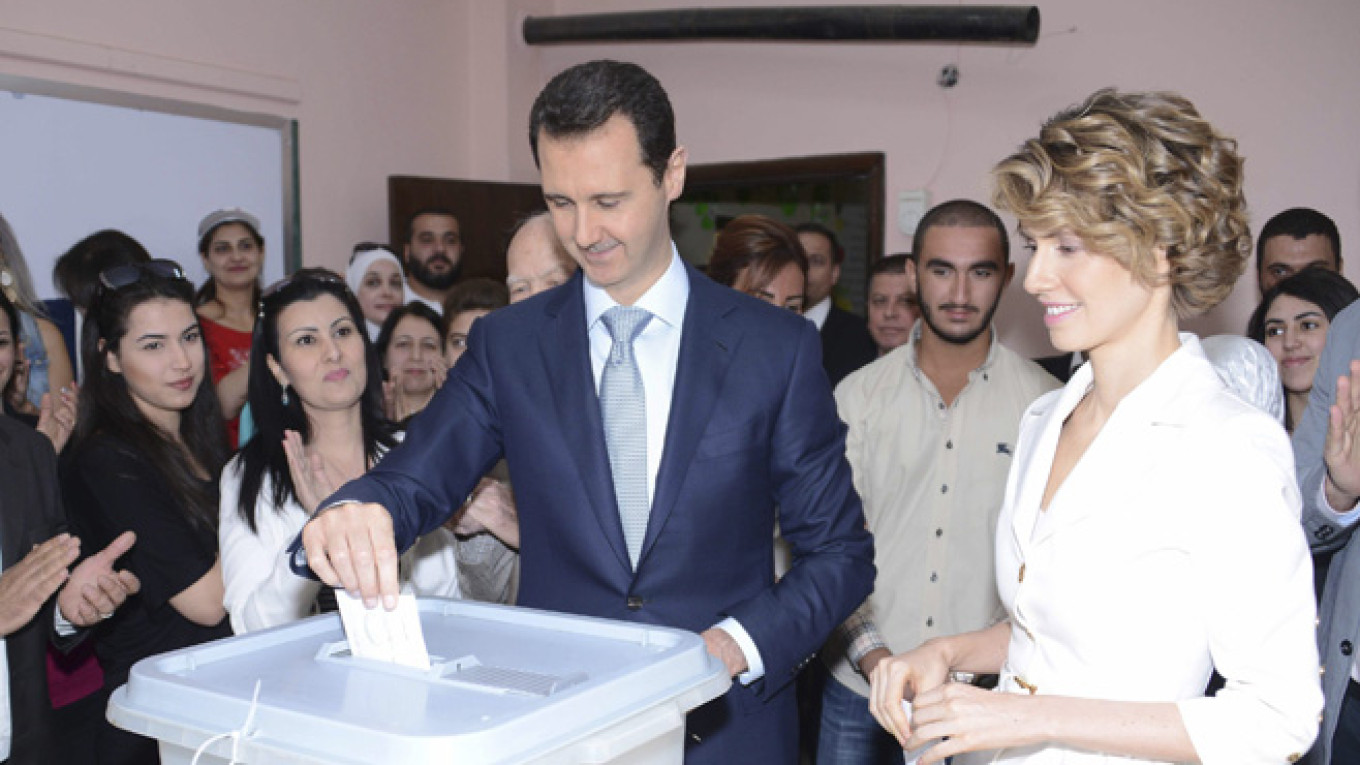Though the presidential election marks a short-term success for the ruling regime of war-torn Syria and its geopolitical patron Russia, it does not signify a decisive victory, Russian analysts said Tuesday.
Voting took place Tuesday in territories controlled by forces loyal to Syrian President Bashar Assad, following a string of victories against rebel troops.
While Tuesday's was the first multi-candidate election in Syrian history, Assad was widely expected to trounce his two competitors, both political extras without public clout.
Experts viewed the vote as an attempt by Assad to boost his perceived legitimacy at home and abroad.
But international recognition beyond the scope of a small circle of friends remains unlikely, and the rebels remain a force to be reckoned with at home, said Vladimir Akhmedov of the Institute of Oriental Studies at the Russian Academy of Sciences.
As Assad's long-term political survival looks unlikely, Moscow's continuing alliance with Damascus betrays a lack of a clear game plan for Syria, Akhmedov said.
"It looks like all we wanted was to keep him afloat until the polls, and we may just go 'bye-bye' now, not really caring if he is out in two or three years," Akhmedov said.
How representative the vote is remains open to debate: The rebels, which control the majority of the Syrian territory, did not allow any polling stations to be set up in their domain. Meanwhile, Assad's forces control most major cities in the country, including Homs and downtown Aleppo, which were retaken in May after bloody infighting.
Russia endorsed the vote, deploying a delegation of lawmakers and Russian electoral officials to monitor the polls.
The delegation saw a hearty reception: Photos posted on social networks showed some members being carried on the shoulders of voters, reportedly amid cries of "[President Vladimir] Putin! Putin!"
But Assad's political opponents were unimpressed. The U.S. State Department denounced the Syrian vote as a "farce," while NATO Secretary-General Anders Fogh Rasmussen said the alliance would not recognize the vote owing to its failure to conform with international standards.
Legit Enough for Moscow
The election will not enhance Assad's legitimacy in the eyes of the Western and Arab leaders that oppose him, experts said.
However, they will hold the symbolic significance for Assad of proving his resilience. When civil strife hit a boiling point in 2011, the regime's days appeared to be numbered, said analysts interviewed by The Moscow Times.
This resilience scores points for Russia, Syria's longtime geopolitical ally, and enables it to to publicly treat Assad as the legitimate representative of the Syrian people, said Alexander Shumilin,? head of the Center for the Analysis of Middle East Conflicts at the Institute for U.S. and Canadian Studies in Moscow.
Official Moscow has blocked several anti-Assad resolutions in the United Nations Security Council, supplied weapons to Damascus and even loaned it 240 million euros ($325 million) for social programs on the eve of the elections, Kommersant reported.
But it was always careful to say it was looking after the interests of Syria, rather than the Assad regime.
Waiting for a Counteroffensive
Assad's success, however, may be short-lived as his foreign opponents have zeroed in on Syrian affairs with renewed fervor following a temporary lull, experts said.
The rebels suffered setbacks, but Assad's forces lack the strength to score a strategic victory, Akhmedov said.
Meanwhile, the rebels can count on increased foreign support and even direct military intervention in Syria, said Yevgeny Satanovsky of the Institute of Middle Eastern Studies.
The West eased up pressure on Damascus after it agreed last September to turn over its chemical weapons to the international community, a process set to wrap by July, Satanovsky said.
However, President Barack Obama and other U.S. officials have vowed recently to ramp up their? involvement in Syria, including by training moderate rebels.
Goals Without a Game Plan
Moscow's involvement in Syria is an attempt to maintain ties with Russia's number one ally in the Arab world, said Akhmedov of the Institute of Oriental Studies.
Russia, which has been battling domestic Islamists for the past two decades, also prefers Assad to the jihadists gunning to overthrow him, said Satanovsky.
But Moscow has no clear strategy for the attainment of its goals in Syria, said Akhmetov.
Moscow should be working to motivate Assad to carry out conciliatory political reforms, Akhmetov and Shumilin agreed.
Moscow should also hedge its bets and reach out to all parties in the Syrian conflict, Akhmedov said. But while Russia made some token moves to the point, including by inviting moderate opposition politicians to Moscow, it never really touched base with Assad's opponents, Akhmedov said.
Meaningful reform appears to be similarly unlikely. Convinced of his own legitimacy, Assad is likely to intensify his military campaign after the vote, Shumilin said.
"He may try limited compromise on his own terms, but no more than that," he said, adding that Assad "has no long-term survival prospects."
See also:
Russia Signals Opposition to Western-Backed Syria Aid Plan
Contact the author at a.eremenko@imedia.ru


